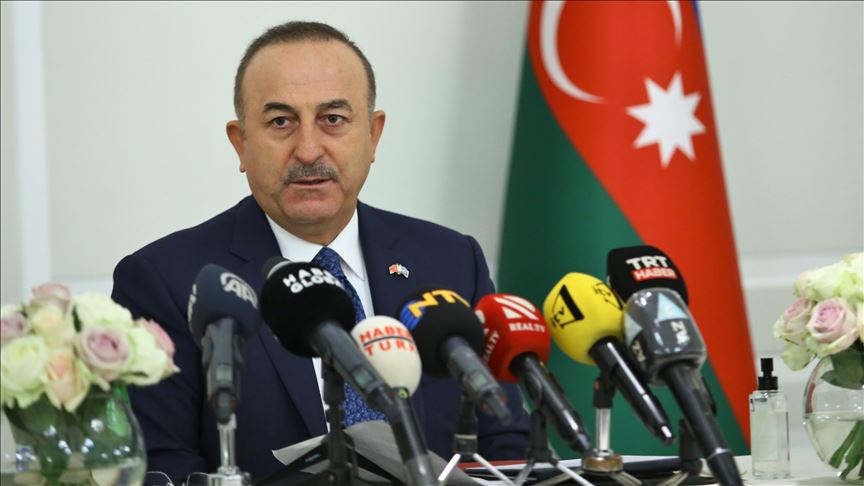'Armenia to pay price if violates cease-fire agreement'
Turkey's role to be exactly same as Russia's on Turkish-Russian monitoring center in Upper Karabakh: Turkish top diplomat
 Turkey's Foreign Minister Mevlut Cavusoglu speaks during a press conference as he visits to hold official meetings in Baku, Azerbaijan on November 12, 2020. ( Resul Rehimov - Anadolu Agency )
Turkey's Foreign Minister Mevlut Cavusoglu speaks during a press conference as he visits to hold official meetings in Baku, Azerbaijan on November 12, 2020. ( Resul Rehimov - Anadolu Agency )
ANKARA
Armenia will "pay price" if it violates the latest peace deal and cease-fire agreement with Azerbaijan on the Upper Karabakh conflict, Turkey's top diplomat said Thursday.
"They [Armenian forces] should either leave the territory voluntarily by abiding the agreement, or the heroic Azerbaijani army will take those lands back as it did so far. There is no other choice," Mevlut Cavusoglu said in a news conference in Baku, Azerbaijan's capital.
Azerbaijan is not "keen to shed blood" and was very patient for solving the conflict in peace, he said, adding: "After that, the choice is on Armenia [to shed blood or solve it in peace]."
"Whatever solution Azerbaijan prefers for the occupied territories and Karabakh issue, we will stand by Azerbaijan," he said.
"The conflict can be solved only by handing over all occupied lands to Azerbaijan," Cavusoglu said, adding that works on the status of Karabakh will continue in the upcoming period.
He underlined that the "only goal" of the peace deal was the return of the occupied lands to Azerbaijan.
"So far, the heroic Azerbaijani army has done what is required on the field, and now, through diplomacy, work is underway to return the occupied lands based on schedule."
Cavusoglu also stressed that France -- a co-chair along with Russia and the US of the Organization for Security and Co-operation in Europe (OSCE) Minsk Group formed in 1992 to find a peaceful solution to the conflict -- has no "objective and balanced" stance on the Upper Karabakh issue.
"The Minsk trio must take a lesson from this process, especially France. Biased statements are being made even after the cease-fire [agreement]," he said.
Peacemaking center
Speaking on the establishment of the peacemaking center to oversee the cease-fire on the Upper Karabakh territory, Cavusoglu said Turkey's role will be exactly the same as Russia's on the joint monitoring.
A memorandum of understanding (MoU) setting up a joint Turkish-Russian center to monitor the peace deal -- which has ended weeks of armed conflict between Azerbaijan and Armenia -- was signed on Wednesday morning, according to Turkish President Recep Tayyip Erdogan.
"We respect the role Russia plays here. They [Russian side] made initiatives for both sides. The dialogue continued and this agreement was signed, with the consent of both sides. The important thing is the next steps to be taken," Cavusoglu said.
He went on to say that in accordance with the fifth article of the deal, Turkey agreed with Russia to launch a joint observation and monitoring center, adding that the details will be discussed with a delegation coming from Russia on Friday.
"The control and surveillance center will be in the territory of Azerbaijan and in places Azerbaijan deems appropriate," he said.
Cavusoglu said the center will perform "important functions", including detection of actions that violate the deal, monitoring of the area through detection and observation with unmanned aerial vehicles and other elements, examination of complaints and violations, and prevention of cease-fire violations.
"The joint working group will determine the formation and working principles of this. But here, most importantly, the authority given by the host country [Azerbaijan], areas identified, and other details will be determined by the brotherly Azerbaijan," he said.
He also wished that the mechanism to be established after the cease-fire will lead to lasting peace and stability in the region.
Conflict, peace deal
Relations between the ex-Soviet republics have been tense since 1991, when the Armenian military occupied Upper Karabakh, also known as Nagorno-Karabakh, a territory recognized as part of Azerbaijan, and seven adjacent regions.
Fresh clashes had erupted on Sept. 27, and the Armenian army continued its attacks on civilian and Azerbaijani forces, even violating humanitarian cease-fire agreements for 44 days.
Baku liberated several cities and nearly 300 of its settlements and villages from Armenian occupation during this time.
Before the second Karabakh war, about 20% of Azerbaijan's territory has been under illegal Armenian occupation for nearly three decades.
On Nov. 10, the two countries signed a Russia-brokered agreement to end the fighting and work towards a comprehensive resolution.
Azerbaijani President Ilham Aliyev hailed the agreement as a victory for his country and a defeat of Armenia, saying Baku's military success enabled it to gain an upper hand to end the three-decade-long occupation of its territory.
Meanwhile, Armenian Prime Minister Nikol Pashinyan said he had signed an "unspeakably painful" deal that allowed Azerbaijan to claim control over regions it took back in the fighting.
The Turkish leadership also welcomed the truce, terming it a "great victory" for Azerbaijan.
Anadolu Agency website contains only a portion of the news stories offered to subscribers in the AA News Broadcasting System (HAS), and in summarized form. Please contact us for subscription options.







